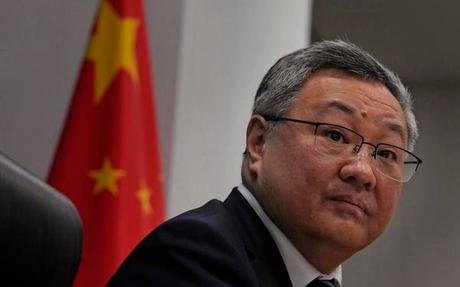
China, Russia, Britain, the United States and France have agreed that a farther spread of nuclear arms and a nuclear war should be avoided, according to a common statement by the five nuclear powers published by the Kremlin on Monday.
It said that the five countries-which are the endless members of the United Nations Security Council- consider it their primary responsibility to avoid war between the nuclear countries and to reduce strategic pitfalls, while aiming to work with all countries to produce an atmosphere of security.
"We affirm that a nuclear war can not be won and must noway be fought,"the English- language interpretation of the statement read.
"As nuclear use would have far- reaching consequences, we also affirm that nuclear munitions - for as long as they continue to live - should serve protective purposes, discourage aggression, and help war."
Chinese Vice Foreign Minister Ma Zhaoxu said the common statement could help increase collective trust and" replace competition among major powers with collaboration and cooperation," adding that China has a"no first use" policy on nuclear munitions, state news agency Xinhua reported.
France also released the statement, emphasizing that the five powers reiterated their determination for nuclear arms control and demilitarization. They would continue bilateral and multinational approaches to nuclear arms control, it said.
The statement from the so- called P5 group comes as bilateral relations between the United States and Moscow have fallen to their smallest point since the end of the Cold War, while relations between Washington and China are also at a low over a range of dissensions.
The Pentagon in November sprucely increased its estimate of China's projected nuclear munitions magazine over the coming times, saying Beijing could have 700 warheads by 2027 and conceivably by 2030.
Washington has constantly prompted China to join it and Russia in a new arms control convention.
Geopolitical pressures between Moscow and Western countries have increased over enterprises about Russia's military buildup near neighbouring Ukraine. Moscow says it can move its army around its own home as it deems necessary.
Last ThursdayU.S. President Joe Biden told his Russian counterpart, Vladimir Putin, that a possible move on Ukraine would draw warrants and an increasedU.S. presence in Europe.
U.S. and Russian officers will hold security addresses onJan. 10 to bandy enterprises about their separate service exertion and defy rising pressures over Ukraine, the two countries said.
A conference on a major nuclear convention that was set to begin on Tuesday at the United Nations has been heldup until August due to the COVID-19 epidemic.
